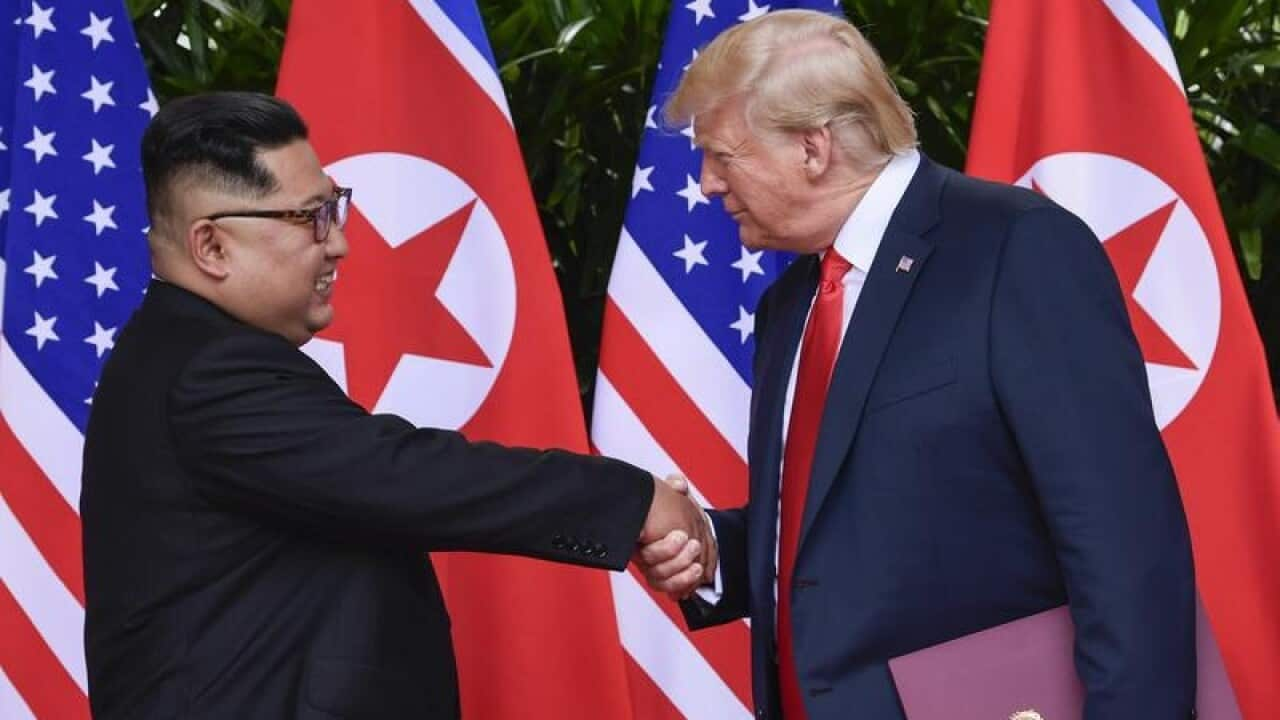Decades after the end of the Korean War in 1953, the remains of dozens of presumed US war dead have began their journey home following a repatriation ceremony in South Korea.
North Korea handed over the remains in 55 boxes last week and allowed a US military transport plane to move them to the US Osan Air Base near Seoul in South Korea.
While it was an apparent goodwill gesture by North Korea toward the United States, the return comes amid growing skepticism about whether the North will follow through on its pledge of nuclear disarmament.

UN honor guards carry a coffin containing the remains of a US soldier who was killed in the Korean War. Source: AAP
Hundreds of US and South Korean troops gathered at a hanger at the Osan base for the repatriation ceremony, which included a silent tribute, a rifle salute and the playing of the US and South Korean national anthems and dirges in front of the UN flag-covered metal cases containing the remains.
The remains were then moved in grey vans to an airfield where US and South Korean soldiers loaded them one by one into transport planes.
The planes will fly them to Hawaii, where they will undergo an in-depth forensic analysis, in some cases using mitochondrial DNA profiles, at a Defense Department laboratory to establish identifications.
US Defense Secretary Jim Mattis said last week that the return of the 55 boxes was a positive step but not a guarantee that the bones are American.
A US defense official said Tuesday that it probably will take months if not years to fully determine individual identities from the remains.
The official, who discussed previously undisclosed aspects of the remains issue on condition of anonymity, also said North Korea provided a single military dog tag along with the remains.

Attenders salute during a repatriation ceremony for the remains of US soldiers who were killed in the Korean War. Source: AAP
The official did not know details about the dog tag, including the name on it or whether it was even that of an American military member.
Vice President Mike Pence, the son of a Korean War veteran, is to fly to Hawaii for what the military calls an "honourable carry ceremony" marking the arrival of the remains on American soil.
The repatriation is a breakthrough in a long-stalled US effort to obtain war remains from North Korea. About 7700 US soldiers are listed as missing from the 1950-53 Korean War, and 5300 of the remains are believed to still be in North Korea.
The bones' return was part of an agreement reached during a June summit between US President Donald Trump and North Korean leader Kim Jong Un. Trump thanked Kim for the return.
During the summit, Kim also agreed to "work toward complete denuclearisation of the Korean Peninsula" in return for Trump's promise of security guarantees. Trump later suspended annual military drills with South Korea which North Korea had long called an invasion rehearsal.
But Trump now faces criticism at home and elsewhere that North Korea hasn't taken any serious steps toward disarmament and may be trying to buy time to weaken international sanctions against it.


